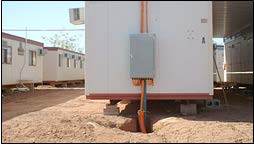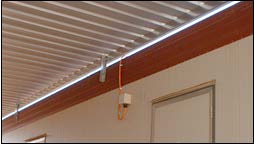Relocatable dwellings - electrical safety
This information bulletin has been developed to assist electrical contractors, electrical workers, owners and operators of relocatable dwellings in understanding the electrical safety issues associated with the transport and connection to low voltage electricity supply of such structures to sites in the Northern Territory.
This bulletin applies to:
- Aboriginal communities
- Mine sites
- Domestic installations
- Commercial installations
- Temporary installations including work camps and construction sites.


Legislation
Work Health and Safety (National Uniform Legislation) Act 2011 (the WHS Act)
Part 2 of the WHS Act - Health and safety duties provides information on the various duties employers and workers to themselves and others.
Work Health and Safety (National Uniform Legislation) Regulations 2011 (the WHS Regulations)
Regulation 147 - Risk management states that a person conducting a business or undertaking at a workplace must manage risks to health and safety associated with electrical risks at the workplace.
If the relocatable dwellings are intended to be used on construction sites then compliance with Regulation 163 of the Regulations and it is also mandatory to comply with AS/NZS 3012 Electrical installations – Construction and demolition sites.
Electrical Safety Act 2022 and Electrical Safety Regulations 2024
Refer to Sections 41 and 42 of the Electrical Safety Act 2022 (ES Act) and Regulation 97 of the Electrical Safety Regulations 2024 for the correct procedure for the issuing of Certificates of Compliance in the Northern Territory.
Under Section 29 to 32 of the ES Act, the Owner or Operator of the relocatable dwelling and their Electrical Contractor have a responsibility to ensure the relocatable dwelling complies with AS/NZS 3000 Wiring Rules prior to connection to a low voltage power source.
Australian Standards
AS/NZS 3001.2 - Electrical installations - Connectable electrical installations and supply arrangements, Part 2 - Connectable electrical installations
If the relocatable dwellings are intended to be relocated frequently and are connected via a plug and socket then compliance with AS/NZS 3001 is mandatory.
AS/NZS 3012 Electrical installations – Construction and demolition sites
If the relocatable dwellings are intended to be used on construction sites then compliance with AS/NZS 3012 Electrical installations – Construction and demolition sites is also mandatory.
AS/NZS 3000:2018 Wiring Rules
Relocatable dwellings manufactured overseas may not be compliant with AS/NZS 3000 Wiring Rules.
The manufacturers Electrical Safety Certificate or similar issued at the time of construction cannot be relied upon once the relocatable dwelling has been transported to site, as damage may have occurred during transportation.
It is vital that the Electrical Contractor who connects the relocatable dwelling to a low voltage electricity supply carry out a full inspection of the dwelling as per Section 8 of AS/NZS 3000 Wiring Rules, which includes removing socket outlets and light switches to ensure that the accessory type and installation methods comply with standards.
A Certificate of Compliance must be submitted which accounts for the entire installation i.e. relocatable dwelling manufactured by XYZ Corporation was tested for compliance with AS/NZS 3000 Wiring Rules following transportation to site, and found to be compliant.
Definitions
Low Voltage is defined by AS/NZS 3000 Wiring Rules as:
- 50 < 1000 Volts AC, or
- 120 < 1500 Volts ripple free DC
A low voltage electricity supply is defined as:
- Mains supply from a supply authority.
- Generator supply, either site power generation or portable generator.
- Inverter Supply from a solar photovoltaic / storage battery system.
- Other alternative energy sources, including wind power, fuel cells, etc.
If you have any doubts about the quality of the electrical installation or connection methods of relocatable dwellings and would like to make a complaint or verify that your intended actions will be correct, please do not hesitate to contact the NT WorkSafe – Electrical Safety Unit.